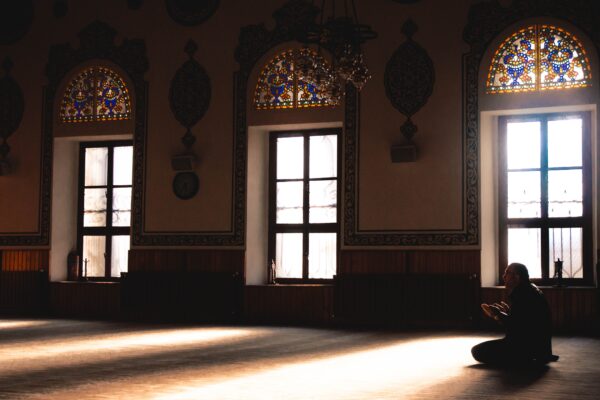Supplication is the weapon of a believer. Here are the best times, places and situations to recite dua.
Supplication is the weapon of a believer. Here are the best times, places and situations to recite dua.
Whenever we need guidance or help, we should turn to dua. It is the most powerful weapon a Muslim has in their armoury. There are certain times, situations or places where duas are more likely to be accepted or be accepted quicker. Here’s our comprehensive list.
at times of oppression
When you are feeling oppressed or burdened, it can be easy to forget about Allah (SWT) as we’re so focused on the tragedy at hand. You might feel angry, frustrated, or even helpless and it can be difficult to know how to react. However, one of the best things you can do in this situation is to recite a dua. Reciting duas can help you to feel more connected to Allah (SWT), which brings about peace in the midst of turmoil.
So, whether you are affected by war or have been unfairly treated at work, recite a dua (anything you want) whilst your heart is heavy and it will reach Allah (SWT) quicker, for the Prophet (PBUH) has said (Tirmidhi):
Three supplications are accepted , there is no doubt in them (about them being accepted): The supplication of the oppressed, the supplication of the traveler, and the supplication of his father against his son.”
When on a journey
The same hadith advises us to travel when on a journey. Whenever you set out on a journey, it is important to remember to recite duas. This will help to ensure your safety and protect you from harm. Therefore, it is imperative that we take the time to ask for His guidance and protection. By doing so, we are showing Allah (SWT) that we put our trust in Him alone.
supplicating as a parent for your child
Ahadith (like the one above) suggest a parent’s dua is never rejected. Some hadith indicate it is the dua of a father for his son, whilst others mention a parent for their children. All parents want what’s best for their children. They want them to be happy and healthy, to grow up to be kind and successful adults, and good Muslims. With this in mind, it’s no wonder that parents often worry about their children. Will they make the right choices? Will they get hurt? Will they be happy? While it’s natural to worry about our children, sometimes these worries can become overwhelming. That’s when we should seek recourse in dua. Dua reminds us that our children are in His hands.
the gap between the adhan and iqamah
When we recite the adhan, the angels gather to pray behind us. The places where we are praying become increasingly blessed. Later, we recite the iqamah before starting the salah. It’s in this short gap one must rigorously recite duas. Don’t waste this time on your phone or with vain talk. Take advantage of the spiritually charged atmosphere to ask for your needs. Reciting in this period is also recommended by Anas bin Malik (Dawud):
The supplication made between the adhan and the iqamah is not rejected.”
Supplicating for someone who is absent
Making dua for those who are not present is a beautiful way to show love and care, and is arguably the purest form of love. It is a reminder that we are all connected and that our actions (in the form of dua) can have a positive impact on others, even when we are not physically together. If you’re missing someone, dead or alive, make a dua for them! In this regard, the Prophet has said (Tirmidhi):
No supplication is more readily responded to, than the supplication made for someone who is absent.”
Supplicating during battle
The large majority of us are not engaged in battle or warfare, but the Prophet has recommended for us to recite dua in this situation. With Prophet Muhammad being the final Prophet, there is surely some way to adapt his guidance in the present day.
We might not be battling with axes and swords, but we may be engaged in battle in other ways. For example, you could be a lawyer fighting for a good cause or for justice against an evil that has taken place. Or you are trying to battle your lower self (nafs). These are also forms of battle and we should seek in Allah’s (SWT) help to grant us victory.
not being impatient during supplication
The Prophet has said all supplications will be granted as long we don’t grow impatient at the response (Muslim):
The supplication of every one of you is granted if he does not grow impatient and says: I supplicated but it was not granted.”
Supplicating with the right etiquette
We recently covered in the detail the etiquette of prayer. Check it out here. Since writing this, we came across another etiquette mentioned by the Prophet in Sunan ibn Majah. Full disclaimer – the hadith is deemed weak but there’s no harm in practicing it:
When you supplicate to Allah, supplicate with your palms uppermost, not with the backs of your hands uppermost, and when you finish, wipe your face with them.”
the supplication for the sick
The words of supplication by the sick are held in high esteem by Allah (SWT) and likened to the supplication of the angels! The Prophet is reported to have said (ibn Majah):
When you enter upon one who is sick, tell him to pray for you, for his supplication is like the supplication of the angels.”
supplicating in sacred places
Undoubtedly, one of the best times to recite dua is when visiting sacred places. Do not waste any precious time spent in the holy lands of Mecca and Madina, inside the Prophet’s mosque and other similar places and make your duas. Such places are frequented by angels and are the sites of miracles!
Supplicating on fridays
We already know jummah is the perfect time to make dua! It is narrated by Bukhari and Muslim that the Prophet said:
On Friday there is an hour when, if a Muslim happens to pray at that time and ask Allah for something good, He will give it to him.”





